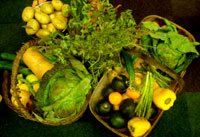
Top stories






More news


Marketing & Media
Ads are coming to AI. Does that really have to be such a bad thing?














The popularity of organic foods - produced naturally without pesticides and potentially harmful fertilisers - has soared in South Africa in recent years.
But research conducted by the University of Leeds in England found that organic farms produced less than half as much food compared with conventional farming and needed twice as much land to produce the same amount of food.
The study also showed there were 10% fewer small birds, such as yellowhammers, corn buntings, linnets, skylarks and lapwings, in organic fields in the UK. Researchers found that larger birds, which were attracted to dense organic crops, were scaring away the smaller birds, disrupting the ecosystem.
But that was not the worst of it.
A recent review commissioned by the UK Food Standards Agency found that organic food was neither more nutritious nor healthier than conventionally farmed food.
Said the agency's Gill Fine: "This study does not mean that people should not eat organic food. What it shows is that there is little, if any, nutritional difference ... there is no evidence of additional health benefits from eating organic food."
But local experts have slammed both reports.
Durban agricultural scientist Dr Raymond Auberbach said that, contrary to the study's findings, organic farming was beneficial to birdlife, adding that conventional farming methods were wiping out birds of prey.
"Pesticides and other harmful chemicals are killing these birds. In fact, organic farming would be more beneficial to the birds and the ecosystem," said Auberbach.
The head of the Biodiversity and Organic Certification Authority in Pretoria, Tim Jackson, said his farm was full of birds and wildlife.
He dismissed the findings on production levels as "hogwash", saying they didn't apply to South Africa. "We are producing twice as much maize. The output is now doubled from what we used to get using the conventional system. We never got produce like this ... it is the most profitable kind of farming and the productivity is amazing.
"It has been accepted worldwide that organically farmed produce has 15% more nutrients than chemical farming."
Diana Callear, head of local organic certification body Ecocert, said organic agriculture required good land management. She said in South Africa the labour intensity of organic agriculture was a plus, as well as reduced use of fuel energy and pesticides.
"Furthermore, organic agriculture does not add to the already high level of pollution of our water systems," she said.
She said studies had found there were more micronutrients in organically produced food.
Source: Sunday Times

For more than two decades, I-Net Bridge has been one of South Africa’s preferred electronic providers of innovative solutions, data of the highest calibre, reliable platforms and excellent supporting systems. Our products include workstations, web applications and data feeds packaged with in-depth news and powerful analytical tools empowering clients to make meaningful decisions.
We pride ourselves on our wide variety of in-house skills, encompassing multiple platforms and applications. These skills enable us to not only function as a first class facility, but also design, implement and support all our client needs at a level that confirms I-Net Bridge a leader in its field.
Go to: http://www.inet.co.za